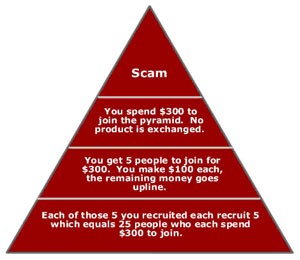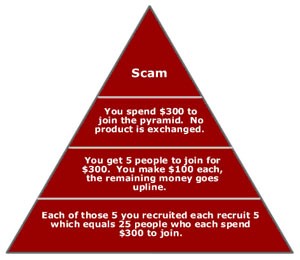Pyramid schemes

- What is a pyramid scheme?
- Warning signs
- Protect yourself from pyramid schemes
- Do your homework
- Decide
- Report them
What is a pyramid scheme?
Pyramid schemes are illegal and very risky ‘get-rich-quick’ schemes that can cost a lot of people a lot of money.
Promoters at the top of the pyramid make their money by having people join the scheme. Then they pocket the fees and other payments made by those who join under them.
In a typical pyramid scheme, a member pays to join. The only way for the member to ever recover any money is to convince other people to join up and to part with their money as well.
In contrast, people in legitimate multi-level marketing earn money by selling genuine products to consumers, not from the recruiting process. Be aware though, some pyramid scheme promoters disguise their true purpose by introducing products that are overpriced, of poor quality, difficult to sell or of little value. Making money out of recruitment is still their main aim.
People often hear about pyramid schemes from friends, family or neighbours. Normally, pyramid schemes recruit members at seminars, home meetings, over the phone or even by mail. Now email, usually as spam, is increasingly used to recruit members as well.
For the scheme to work so that everyone can make a profit there would have to be an endless supply of new members. In reality, the number of people willing to join the scheme (and therefore, the amount of money coming into the scheme) dries up very quickly. When the pyramid collapses (and they all do) relationships, friendships and even marriages can be destroyed over money lost in the scam.
In Australia, it is against the law not only to promote a pyramid scheme, but even to participate in one.
Warning signs
- You are offered a chance to join a group, scheme, program or team where you need to recruit new members to make money.
- The scheme involves offers of goods or services of little or doubtful value that serve only to promote the scheme (such as information sheets).
- There is a big up-front cost to pay for large quantities of goods.
- There are no goods or services being offered for sale by the scheme.
- The promoter makes claims like ‘this is not a pyramid scheme’ or ‘this is totally legal’.
Protect yourself from pyramid schemes
- If it looks too good to be true—it probably is.
- Use your common sense: the offer may be a scam.
- Do not let anyone pressure you into making decisions about money or investments: always get independent financial advice.
- You can contact your local office of fair trading, ASIC or the ACCC for assistance.
- Beware of products or schemes that claim to guarantee income or winnings.
- Remember that family members and friends may try to involve you in a scam without realising that it is a scam: you should seek independent advice (from a lawyer or financial adviser)
As well as following these specific tips, find out how to protect yourself from all sorts of other scams.
Do your homework
Pyramid schemes often look like legitimate multi-level marketing schemes. To tell the difference between them, ask yourself these two questions:
- Are the rewards you have been promised based on product sales (by either yourself or others you introduce to the scheme)?
- Are the products genuine products of real value, at a reasonable price and the type of thing that consumers will want to buy time and time again?
If you are unsure or answered no to either of these questions, there is a real chance that the scheme is a pyramid scheme.
If you have doubts about a particular marketing scheme, the ACCC, ASIC or your state or territory fair trading agency may be able to help. As with any other investment decision, you should seek independent advice (for example, from a lawyer or accountant) before you make a decision.
Decide
If you believe that an offer is a pyramid scheme, do not take part—it is very likely that you will lose your money and you could be breaking the law. If the offer was made to you by a friend or family member, you should also warn them that they might be involved in a risky and illegal scam.
If you believe that the offer could be a legitimate multi-level marketing scheme, make sure you get independent advice before signing up or investing any money.
Report them
If you think you might be involved in a pyramid scheme, stop participating in the scheme immediately and contact ASIC, the ACCC or your state or territory fair trading agency. You can do this through the report a scam page on SCAMwatch. You should also warn other people you think may have been approached about joining the scheme.
















